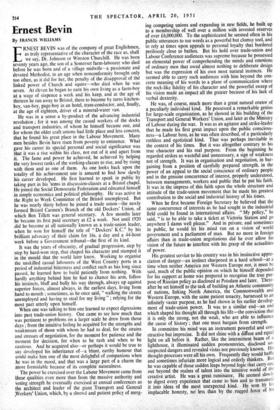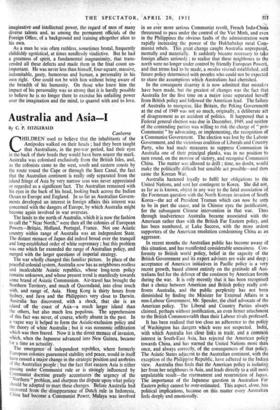Ernest Bevin
F4 RNEST BEVIN was of the company of great Englishmen. as truly representative of the character of the race as, shall we say, Dr. Johnson or Winston Churchill. He was born seventy years ago, the son of a Somerset farm-labourer who died before he was born and of a village midwife—a passionate and devoted Methodist, in an age when nonconformity brought only too often, as it did for her, the penalty of the disapproval of thd linked power of Church and squire—who died when he was seven. At eleven he began to earn his own living as a farm-boy at a wage of sixpence a week and his keep, and at the age of thirteen he ran away to Bristol, there to become by turns kitchen- boy, van-boy, page-boy in an hotel, tram-conductor, and, finally, at the age of eighteen, driver of a mineral-water van.
He was in a sense a by-product of the advancing industrial revolution ; for it was among the casual workers of the docks and transport industries, of whom he himself became one, and for whom the older craft unions had little place and less concern, that be found his great place in the. Labour Movement. Many men besides Bevin have risen from poverty to eminence. What gave his career its special personal and social significance was that it was a rise within his class, not out of it and apart from it. The fame and power he achieved, he achieved by helping the very lowest ranks of the working-classes to rise, and by rising with them and as one of them. As one looks back upon the totality of his achievement one is amazed to find how slowly his career developed. He first learned to speak in public by taking part in his 'teens in discussion-classes at a Bristol chapel. He joined the Social Democratic Federation and educated himself in simple economics and political philosophy. He was active in the Right to Work Committee of the Bristol unemployed. But he was nearly thirty before he joined a trade union—the newly formed Bristol Carmen's Branch of the old Dockers' Union. of which Ben Tillett was general secretary. A few months later he became its first paid secretary at £2 a week. Not until 1920 did he become at all nationally known as a trade-union leader, when he won for himself the title of " Dockers' K.C." by his brilliant advocacy of their claim for 16s. a day and a 44-hour week before a Government tribunal—the first of its kind.
It was the years of obscurity, of gradual progression, step by step by hard-won step, that shaped his character and stamped it in the mould that the world later knew. Working to organise the unskilled casual labourers of the West Country ports in a period of industrial bitterness and conflict such as has long since passed, he learned how to build patiently from nothing. With hardly anything behind him he had to chance his arm, follow his instincts, bluff and bully his way through, always up against superior forces, almost always, in the earliest days, living from hand to mouth ; sometimes, as he once said, " walking the streets unemployed and having to steal for my living" ; relying for the most part utterly upon himself.
When one was talking to him one learned to expect digressions into past trade-union history. One came to See how much that was pertinent to problems on a larger scale he drew from those days ; from the intuitive feeling he acquired for the strengths and weaknesses of those with whom he had to deal, for the strains and stresses of negotiation, for the moment for patience and the moment for decision, for when to be rash and when to be cautious. And he acquired also—or perhaps it would be true to say developed his inheritance of—a blunt, earthy humour that could make him one of the most delightful of companions when he was in the mood, and that was a large part of a charm the more formidable because of its complete naturalness.
The power he exercised over the Labour Movement came from these qualities even more than from the massive authority and voting strength he eventually exercised at annual conferences as the architect and leader of the giant Transport and General Norkers' Union, which, by a shrewd and patient policy of merg- ing competing unions and expanding in new fields, he built up to a membership of well over a million with invested reserves of over £6,000,000. To the sophisticated he seemed often in his public utterances to use words as a powerful but clumsy tool, and to rely at times upon appeals to personal loyalty that bordered perilously close to bathos. But his hold over trade-union and Labour Conference audiences was supreme because he possessed an elemental power of comprehending the minds and emotions of ordinary men that owed almost nothing to deliberate design but was the expression of his own most natural instincts. He seemed able to carry such audiences with him beyond the con- crete meaning of his words to a plane of communication where the rock-like fidelity of his character and the powerful sweep of his vision made an impact all the greater because of his lack of verbal dexterity.
He was, of course, much more than a great natural orator of a peculiarly individual kind. He possessed a remarkable genius for large-scale organisation, as he showed in his building of the Transport and General Workers' Union, and later at the Ministry of Labour during the war. It was as an agitator and strike-leader that he made his first great impact upon the public conscious- ness—a Labour boss, as he was often described, of a particularly ruthless and egotistical kind. That was perhaps inevitable in the context of his times. But it was altogether contrary to his true character and his real purpose. From the beginning he regarded strikes as wasteful and unnecessary, a sign of weakness not of strength. It was in organisation and negotiation, in bar- gaining from a position of carefully prepared strength, in the power of an appeal to the social conscience of ordinary people and in the genuine concurrence of interest, properly understood. between managements, workers and public that he put his faith. It was in the impress of this faith upon the whole structure and attitude of the trade-union movement that he made his greatest contribution to the social and industrial history of his times.
When he first became Foreign Secretary he believed that the same concurrence of interests as he had sought in the industrial field could be found in international affairs. " My policy," he said. " is to be able to take a ticket at Victoria Station and go anywhere I damn well please." And in private, and sometimes in public, he would let his mind run on a vision of world government and a parliament of man. But no more in foreign affairs than in trade-union negotiations did he ever allow his vision of the future lo interfere with his grasp of the actualities of power.
His greatest service to his country was in his instinctive appre- ciation of danger—an instinct sharpened in a hard school—at a time when neither America nor Western Europe nor, it must be said, much of the public opinion on which he himself depended for his support at home was prepared to recognise the true pur- pose of Russian policy as disclosed at Potsdam and later. There- after he set himself to the task of building an Atlantic community of nations, linking North America, the Commonwealth and Western Europe, with the same patient tenacity, harnessed to an infinitely vaster purpose, as he had shown in his earlier develop- ment of trade-union power. It was to a similar end—an end which shaped his thought all through his life--the conviction that it is only the strong, not the weak, who are able to influence the cause of history ; that one must bargain from strength.
In committee his mind was an instrument powerful and con- structive but imprecise. It did not shine with a diffuse and equal light on all before it. Rather, like the intermittent beam of a lighthouse, it illuminated sudden promontories, disclosed un- suspected dangers and revealed vistas not previously known. His thought-processes were all his own. Frequently they would baffle and sometimes infuriate more logical and orderly thinkers. But he was capable of those sudden leaps beyond logic that carry one out beyond the realms of talent into the intuitive world of the creative artist. He was a great ruminator. He seemed slowly to digest every experience that came to him and to transmute it into ideas of the most unexpected kind. He won by his implacable honesty, no less than by the rugged force of his imaginative and intellectual power, the regard of men of many diverse talents and, as among the permanent officials of the Foreign Office, of a background and training altogether alien to his own.
As a man he was often ruthless, sometimes brutal, frequently childishly egotistical, at times needlessly vindictive. But he had a greatness of spirit, a fundamental magnanimity, that trans- cended all these defects and made them in the final count un- important. He was never less than himself, four-square, massive, indomitable, gusty, humorous and human, a personality in his own right. One could not be with him without being aware of the breadth of his humanity. On those who knew him the impact of his personality was so strong that it is hardly possible to believe he is no longer there to exercise his unfailing power over the imagination and the mind, to quarrel with and to love.



































 Previous page
Previous page